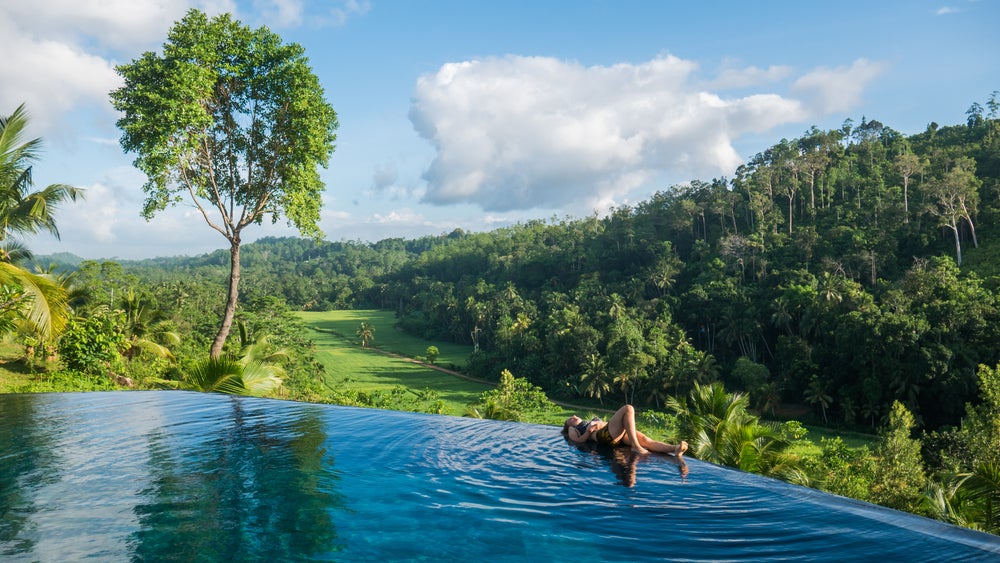
The global hotel industry is at the forefront of the climate crisis. This has recently been exemplified by the wildfires in Rhodes and Maui, where thousands of tourists and locals were displaced by environmental catastrophes caused by climate change.
It is therefore important that travellers and hoteliers work together to minimise their impact on the environment and to embed eco-friendly practices into every aspect of travel and accommodation.
How well do you really know your competitors?
Access the most comprehensive Company Profiles on the market, powered by GlobalData. Save hours of research. Gain competitive edge.

Thank you!
Your download email will arrive shortly
Not ready to buy yet? Download a free sample
We are confident about the unique quality of our Company Profiles. However, we want you to make the most beneficial decision for your business, so we offer a free sample that you can download by submitting the below form
By GlobalDataFor the conscious traveller, aware of the devastating impacts that tourism can have on the environment, nature hotels and agricultural tourism offer a chance to travel more sustainably.
While nature hotels might seem like utopian and escapist experiences, the operations keeping them open are complex.
Hotel Belmar, located in Monteverde, Costa Rica, is a pioneer of agricultural tourism. Founded in 1985, the hotel is situated on family-owned farmland acquired in 2010. Hotel Belmar is Monteverde’s first carbon-neutral hotel, while the Finca Madre Tierra is reportedly the first carbon-neutral farm in Costa Rica.
Hotel Management Network spoke to Hotel Belmar’s general manager Pedro Belmar to uncover the detailed work and planning that goes on behind the scenes in nature hotels.
What are the opportunities and challenges in agricultural tourism?
Pedro: The percentage of guests interested in agriculture and farming is growing and Hotel Belmar believes that the global awareness of the topic plays a part. The awareness allows people to further understand the situation and awakens their curiosity about the topic, making them want to change their practices and daily habits and acknowledge the process that products go through before getting to their table.
Agritourism can also be an opportunity to entice visitors to create new habits to offset their carbon footprint, such as a donation to a local reforestation programme like the Monteverde Fund, or bringing or purchasing supplies to donate to communities in need.
On the ground, agricultural tourism is an opportunity to launch community projects with hands-on solutions such as Hotel Belmar’s H4 alliance with four other hotels in the Monteverde area. The properties choose objectives to support, and contribute to community-building or improving practices which can include funding, design and marketing, youth initiatives, reforestation and many more.
Logistics can also be a challenge to ensuring a holistic approach to agritourism, from maximising crop variety and yields on small-scale plots to water conservation, the use of natural pest controls, the organic enrichment of the soil and correctly storing and planning produce for the enjoyment of guests.
Agricultural tourism is often dependent on the seasonal nature of agricultural activities, which can limit the availability of experiences and attractions throughout the year. This can lead to uneven income and visitor patterns, making it difficult for operators to sustain their businesses year-round.
Agricultural activities are also heavily reliant on good weather conditions. Unfavourable weather patterns, such as droughts, floods or severe storms, can impact the quality and availability of agricultural experiences, causing visitor dissatisfaction and potential revenue loss.
Crucially, such activities need to be carefully managed to ensure that they do not negatively impact primary agricultural operations. Operators of working farms face the challenging task of accommodating visitors while maintaining the productivity and integrity of the farm.
What is unique about nature hotels?
Pedro: Nature hotels are an opportunity for travellers to truly immerse themselves in their destination, learn about the environment and leave a positive mark on their travels.
Guests may also be surprised to know that they don’t have to sacrifice luxury in the name of sustainability.
In the case of Hotel Belmar, the property began as a lodging option for people who visited to study and appreciate the pristine cloud forest in the region. It was always clear to the founders that the well-being of their business, the natural surroundings and the community were all intertwined.
Hotel Belmar’s long-standing commitment to nature is illustrated in the scope, strength and growth of its initiatives in environmental stewardship, regeneration of the ecosystem, economic benefit to the local communities and cultural activities that promote diversity. At least 75% of guest reviews mention Finca Madre Tierra or the hotel’s farm-to-table programme as one of the highlights of their trip.
As a nature hotel, it’s important to showcase nature but also protect it. The design of Hotel Belmar is key to highlighting the region’s natural surroundings, from wide floor-to-ceiling windows for guests to enjoy the landscape, to locally sourced wood and decor. Most of the hotel’s furniture has been made in-house with sustainably sourced wood from Costa Rica, and the property works with local artists and artisans to decorate their spaces.
How are nature hotels addressing the climate crisis?
Pedro: Nature hotels have to contend with strict guidelines and procedures to respect the nature around them. Among many other measures, this includes limits to the number of people and the way in which wildlife areas are entered and visited; strict policies against feeding or handling wild animals; use of native plants for gardens to encourage healthy ecosystems, and drought tolerance and reforestation in designated areas of the property.
Certification programmes are an effective way to make sure that businesses are walking the walk. However, these can be inaccessible and expensive to implement. Hotel Belmar has been carbon-neutral certified since 2016 and has the highest possible sustainability ratings in the Costa Rica Tourism Board’s Ecologic Blue Flag Programme for climate change.
The hotel has also installed solar panels to heat water for all buildings, upgraded its water treatment systems to become artificial wetlands that drastically increased the quality of its treated water, and installed rain collection systems. This is in addition to an on-site greenhouse and organic gardens to grow much of the food being consumed.








